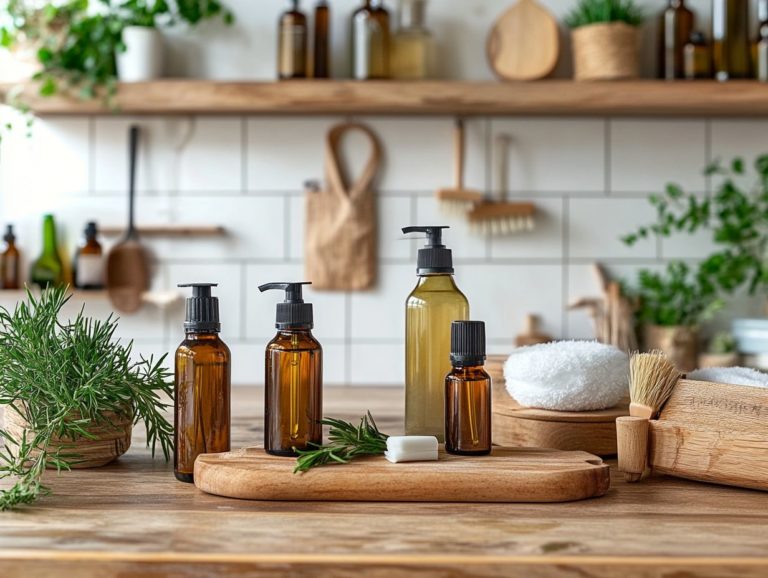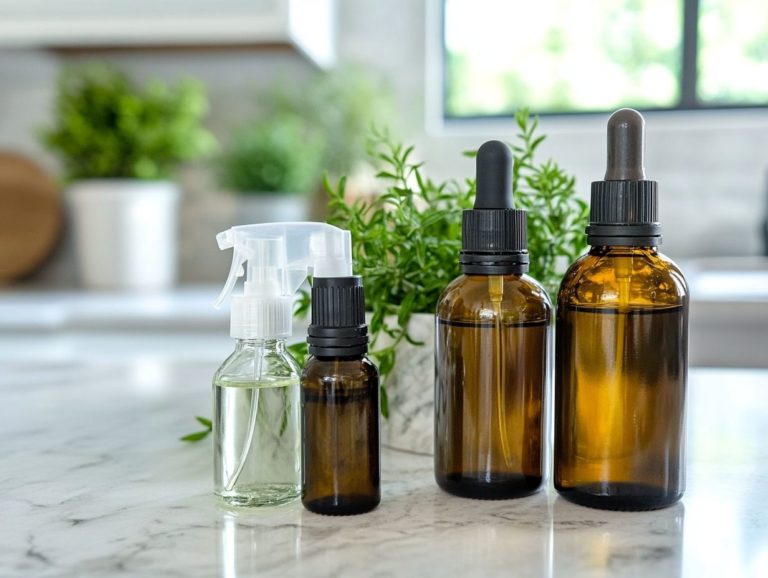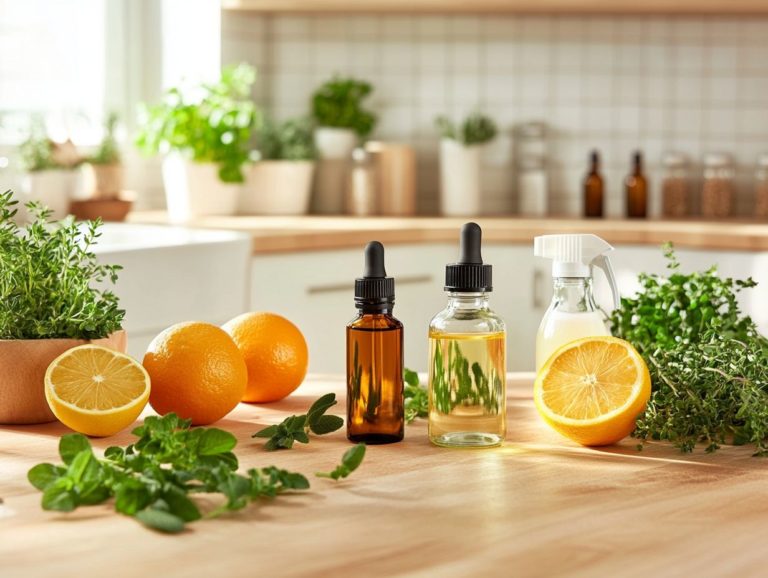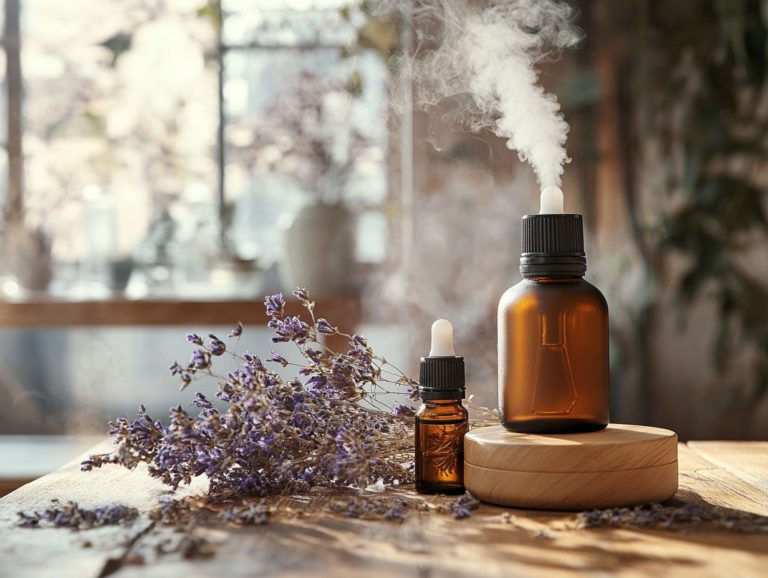Essential Oils vs. Chemical Cleaners: A Comparison
In today s world, the choice between essential oils and chemical cleaners matters more than ever. With rising concerns about health and environmental safety, grasping the differences between these two cleaning options is crucial for making smart choices.
This article delves into their ingredients, effectiveness, and potential health impacts. It empowers you to make informed decisions for your home. It also highlights the advantages of using essential oils while addressing the risks linked to chemical cleaners. Practical tips for achieving a cleaner and safer living space are also offered.
Contents
- Key Takeaways:
- What Are the Differences Between Essential Oils and Chemical Cleaners?
- What Are the Benefits of Using Essential Oils for Cleaning?
- What Are the Risks of Using Chemical Cleaners?
- How Can Essential Oils Be Used for Cleaning?
- Which Is Better: Essential Oils or Chemical Cleaners?
- Frequently Asked Questions
- What are essential oils and chemical cleaners?
- What are the benefits of using essential oils for cleaning?
- How do chemical cleaners compare to essential oils in terms of effectiveness?
- Are essential oils more expensive than chemical cleaners?
- Can essential oils and chemical cleaners be used together?
- Which is better for the environment, essential oils or chemical cleaners?
Key Takeaways:
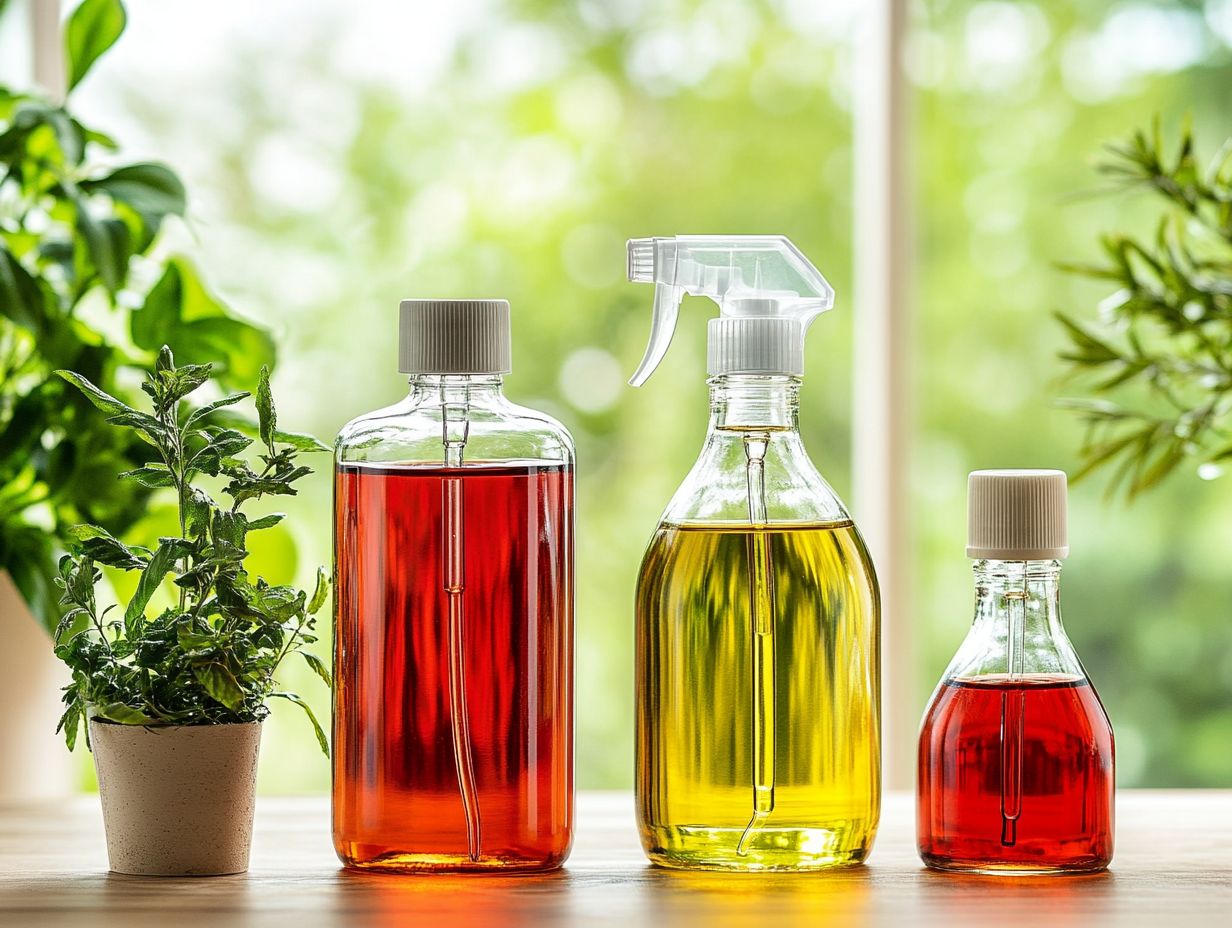
- Essential oils are made from natural ingredients and have antibacterial properties, making them a safer and more environmentally friendly option for cleaning.
- Chemical cleaners contain harmful substances and can cause respiratory irritation and environmental pollution, posing potential health risks.
- Essential oils can be used in various cleaning products such as all-purpose cleaner, disinfectant spray, laundry detergent, and air freshener, providing a versatile and effective alternative to chemical cleaners.
What Are the Differences Between Essential Oils and Chemical Cleaners?
Understanding the differences between essential oils and chemical cleaners is vital for you as an eco-conscious consumer looking for effective cleaning solutions that prioritize both health and environmental sustainability.
Essential oils, sourced from plants, provide natural cleaning options that feature organic ingredients and non-toxic formulas. In contrast, chemical cleaners frequently contain synthetic ingredients and potentially harmful chemicals, which can lead to health risks and higher levels of harmful chemicals released into the air.
By exploring these distinctions, you enable yourself to make informed choices that foster a healthy home while simultaneously contributing to waste reduction and effective ecological footprint management.
1. Ingredients
The ingredients you choose in cleaning products play a crucial role in determining their effectiveness and safety, especially when it comes to eco-friendly solutions and non-toxic living.
Natural cleaning products often incorporate essential oils and other plant-derived ingredients, which are remarkable for their ability to clean efficiently without exposing you to harmful chemicals. In contrast to synthetic cleaners that may harbor toxic substances capable of irritating your skin or respiratory system, eco-friendly formulations tap into the power of organic ingredients that are both biodegradable and safe for the environment.
These plant-derived surfactants not only deliver impressive cleaning results but also infuse your space with delightful aromas, turning routine chores into more enjoyable experiences. By opting for organic components, you ensure that your cleaning products contribute to a healthier lifestyle, reducing the overall chemical burden in your home while promoting sustainability.
2. Effectiveness
The effectiveness of cleaning products is crucial for achieving pristine surfaces in your home, and this is where essential oils present a compelling alternative to traditional chemical cleaners.
These natural solutions not only boast powerful cleaning properties but also enhance your indoor environment by reducing exposure to harsh chemicals. For example, tea tree oil is celebrated for its antifungal and antibacterial qualities, making it an excellent choice for combating mold and mildew in bathrooms.
Similarly, lemon essential oil, with its natural grease-cutting abilities, excels in the kitchen, effortlessly slicing through grime on countertops and appliances. By incorporating these eco-friendly cleaning products into your routine, you can enjoy a safe, effective, and aromatic approach to maintaining your living spaces.
Start your journey towards a healthier home today by incorporating essential oils into your cleaning routine!
3. Health Effects
Cleaning products can affect your health. It s important to choose safer alternatives. Be aware of the potential health hazards linked to chemicals that can evaporate and harm air quality, often found in many cleaners.
Prolonged exposure to these compounds can lead to respiratory issues and worsen conditions such as asthma or allergies. They may also present long-term health risks. Non-toxic formulas made from essential oils clean effectively and provide therapeutic benefits, enhancing your overall well-being.
By choosing eco-friendly products, you help create a healthier indoor environment. This reduces chemical exposure and minimizes the risk of harmful reactions. As more people recognize these health implications, they are turning to natural cleaning alternatives. This shift is creating safer homes and promoting a cleaner planet.
4. Environmental Impact
The environmental impact of cleaning products matters. Your choice can influence our planet s health. By opting for biodegradable items, you enhance your home environment and help reduce waste.
Every time you select eco-friendly cleaning products, you help diminish the harmful residues that traditional cleaners leave behind. This effectively reduces pollution in our ecosystems.
Adopting sustainable practices in product formulation can significantly cut down trash that goes to landfills and safeguard water quality. Your mindful choices inspire your community to embrace greener alternatives and foster a commitment to long-term environmental stewardship.
What Are the Benefits of Using Essential Oils for Cleaning?
Discover how essential oils can transform your cleaning routine! Utilizing essential oils for cleaning presents a wealth of benefits that go beyond just appearances. These eco-friendly solutions not only enhance the cleanliness of your home but also contribute to a safer living environment.
The natural ingredients within essential oils have powerful antibacterial properties. They also fill your space with delightful aromas, turning the task of cleaning into an uplifting experience.
Rest assured, essential oils are safe for both children and pets. This means you can create a healthy home without sacrificing safety or peace of mind.
1. Natural Ingredients
Natural ingredients found in essential oils elevate your cleaning routine and enrich your home environment. These plant-derived elements are formidable alternatives to the synthetic chemicals often found in commercial cleaning products.
Take tea tree oil, for instance. Its well-known antibacterial properties make it an exceptional choice for disinfecting surfaces, ensuring a safer atmosphere for your family. Lemon essential oil not only adds a refreshing aroma but also serves as a natural degreaser, cutting through grime effortlessly.
Lavender oil enhances air quality while imparting a soothing effect. This transforms the chore of cleaning into a more enjoyable experience.
By choosing organic ingredients, you harness the power of nature to maintain a clean, healthy home all without sacrificing your well-being or the planet.
2. Antibacterial Properties
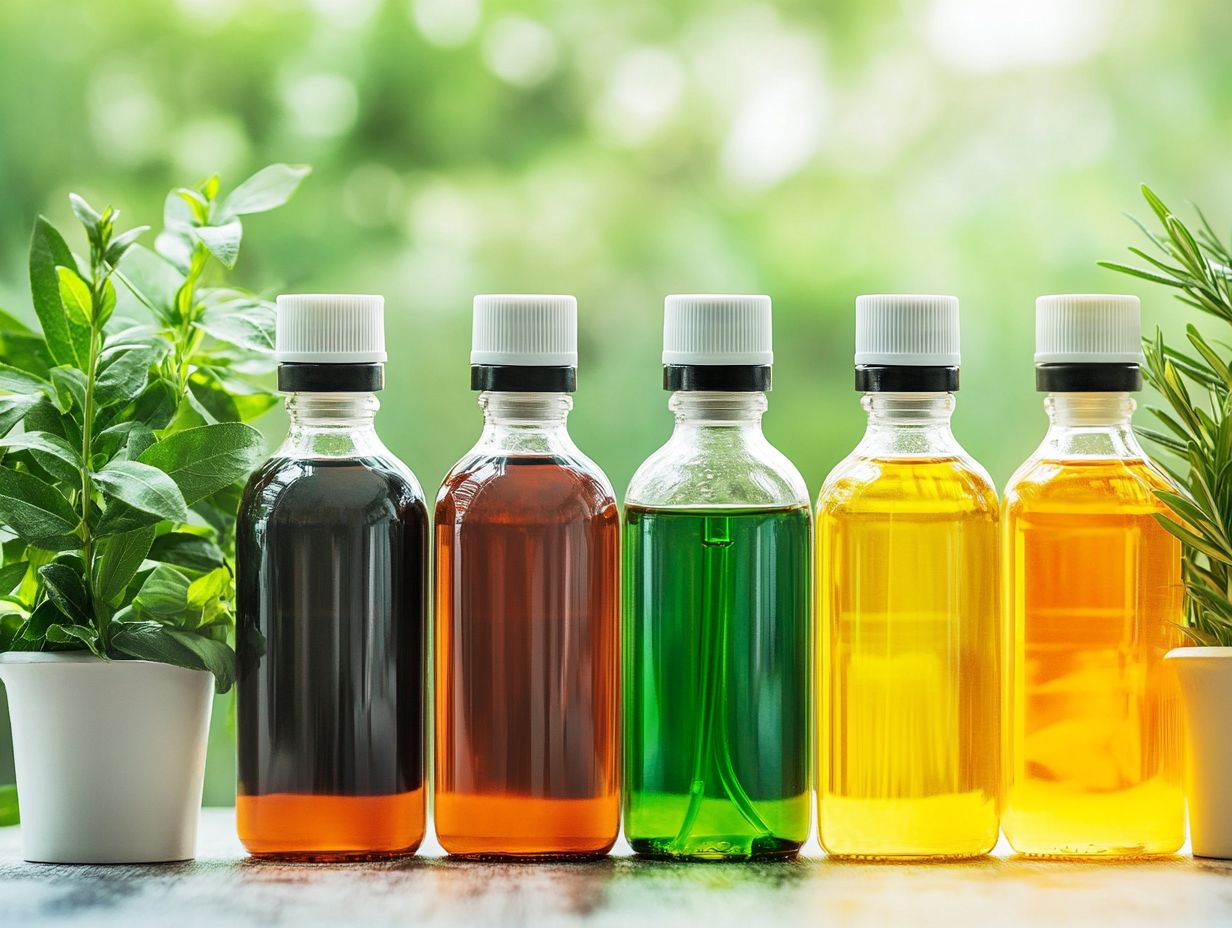
One of the standout features of essential oils is their strong antibacterial qualities. They are exceptionally effective for cleaning and sanitizing a variety of surfaces.
These compounds disrupt the cellular structure of bacteria and pathogens. This renders them incapable of functioning or reproducing effectively. This method sets essential oils apart from traditional chemical cleaners, which often rely on harsher agents that can leave harmful residues and contribute to environmental degradation.
Take tea tree oil, for example; it s widely celebrated for its ability to eliminate a broad spectrum of bacteria. Lavender oil adds a delightful fragrance and also boasts impressive antibacterial qualities. Eucalyptus oil is known for its effectiveness against common germs, making it a favored choice in eco-friendly cleaning solutions.
In contrast, while traditional cleaners merely mask odors and superficially cleanse surfaces, essential oils provide a deeper level of sanitation. This aligns seamlessly with a holistic approach to health and environmental stewardship.
3. Pleasant Aroma
The delightful aroma of essential oils elevates your cleaning routine and creates a more inviting atmosphere in your home.
By incorporating these natural fragrances, you can significantly boost your mood and enhance your mental well-being while tackling household chores. For instance, the refreshing scent of lemon essential oil invigorates the senses, making cleaning feel less like a chore and more like a rejuvenating experience.
Similarly, lavender oil leaves your spaces smelling heavenly while helping to reduce stress and anxiety. This promotes a sense of tranquility.
As you engage in your cleaning rituals, these aromatic companions can transform an everyday task into a delightful self-care practice. This ultimately leads to a more harmonious living environment.
4. Safe for Children and Pets
Safety is a top priority for your family. Essential oils emerge as an exceptional cleaning choice that is safe for both children and pets.
This allows you to enjoy a worry-free cleaning experience in a healthy home. Unlike synthetic cleaners, which often contain harsh chemicals, essential oils provide a natural alternative that cleans effectively without compromising safety.
Oils like lavender not only deliver a soothing aroma but also have antibacterial properties, making them perfect for cleaning surfaces in family-friendly environments.
Lemon essential oil is celebrated for its natural disinfectant qualities and refreshing scent. This ensures that your home remains both clean and inviting.
By opting for these natural solutions, you foster a healthier living space and cultivate a sense of security in homes with little ones and beloved pets.
What Are the Risks of Using Chemical Cleaners?
Chemical cleaners may be touted as the ultimate solution for household cleaning, but it’s crucial to recognize the significant risks they pose to both your health and the environment.
Many of these products contain harmful chemicals linked to health issues like respiratory irritation and allergic reactions. They also contribute to volatile organic compound (VOC) emissions that can severely compromise your indoor air quality.
Moreover, the environmental pollution from the improper disposal of these cleaners can have lasting repercussions on fragile ecosystems. It’s essential to stay informed about these potential dangers.
1. Harmful Chemicals
Chemical cleaners often contain harmful substances that can pose significant health risks to you and those who share your home. It’s essential to approach their use with awareness and caution.
Compounds like ammonia, bleach, and phthalates frequently lurk in household cleaning products, leading to a variety of health issues. For example, ammonia can irritate your respiratory system and eyes. Prolonged exposure to bleach may worsen asthma symptoms and result in skin irritation.
Vulnerable populations, especially children and pets, are particularly at risk due to their smaller body size and developing systems. Children may inadvertently touch surfaces that still hold residues, while pets could suffer adverse effects if they ingest or inhale these toxic substances, potentially leading to serious health complications.
2. Respiratory Irritation
One of the most prevalent health concerns linked to chemical cleaners is respiratory irritation, often worsened by the chemicals they emit during use.
These chemicals can trigger a variety of symptoms, such as coughing, throat irritation, and shortness of breath. They pose significant risks, especially for individuals with pre-existing conditions like asthma. Prolonged exposure can lead to chronic respiratory problems and heightened sensitivity to allergens.
To mitigate these risks, it’s essential for you to ensure proper ventilation when using such products. Opening windows and employing exhaust fans can greatly dilute harmful substances lingering in the air.
Consider using eco-friendly alternatives like vinegar or baking soda; these options can effectively clean surfaces without releasing harmful chemicals, ultimately nurturing a healthier home environment.
3. Environmental Pollution
The use of chemical cleaners can significantly contribute to environmental pollution, amplifying your ecological footprint and posing risks to water resources and ecosystems.
When these substances are improperly disposed of, they can seep into the soil and waterways, leading to contamination that endangers both wildlife and human health. Runoff from households and industrial sites can transport these toxic chemicals into rivers, lakes, and oceans, resulting in detrimental effects on aquatic life and the environment at large.
Act now to recognize that adopting sustainable waste management practices such as proper disposal, recycling, and opting for eco-friendly alternatives can make a real difference! By cultivating awareness and a sense of responsibility, you, along with industries, can play a crucial role in preserving the fragile balance of our ecosystems.
4. Potential Health Risks
Beyond immediate reactions, chemical cleaners present potential health risks that could lead to chronic health conditions over time, raising significant concerns for those who use these products regularly.
As someone who frequently relies on these cleaners, you may unknowingly increase your exposure to harmful substances that can build up in your body. This prolonged contact has been associated with respiratory issues, hormonal imbalances, and even neurological disorders.
It s essential for you to consider the long-term implications of these hazardous chemicals before making choices for your home. By opting for eco-friendly alternatives, you not only foster a healthier indoor environment but also significantly reduce the risk of future health complications, promoting overall well-being for yourself and your family.
How Can Essential Oils Be Used for Cleaning?
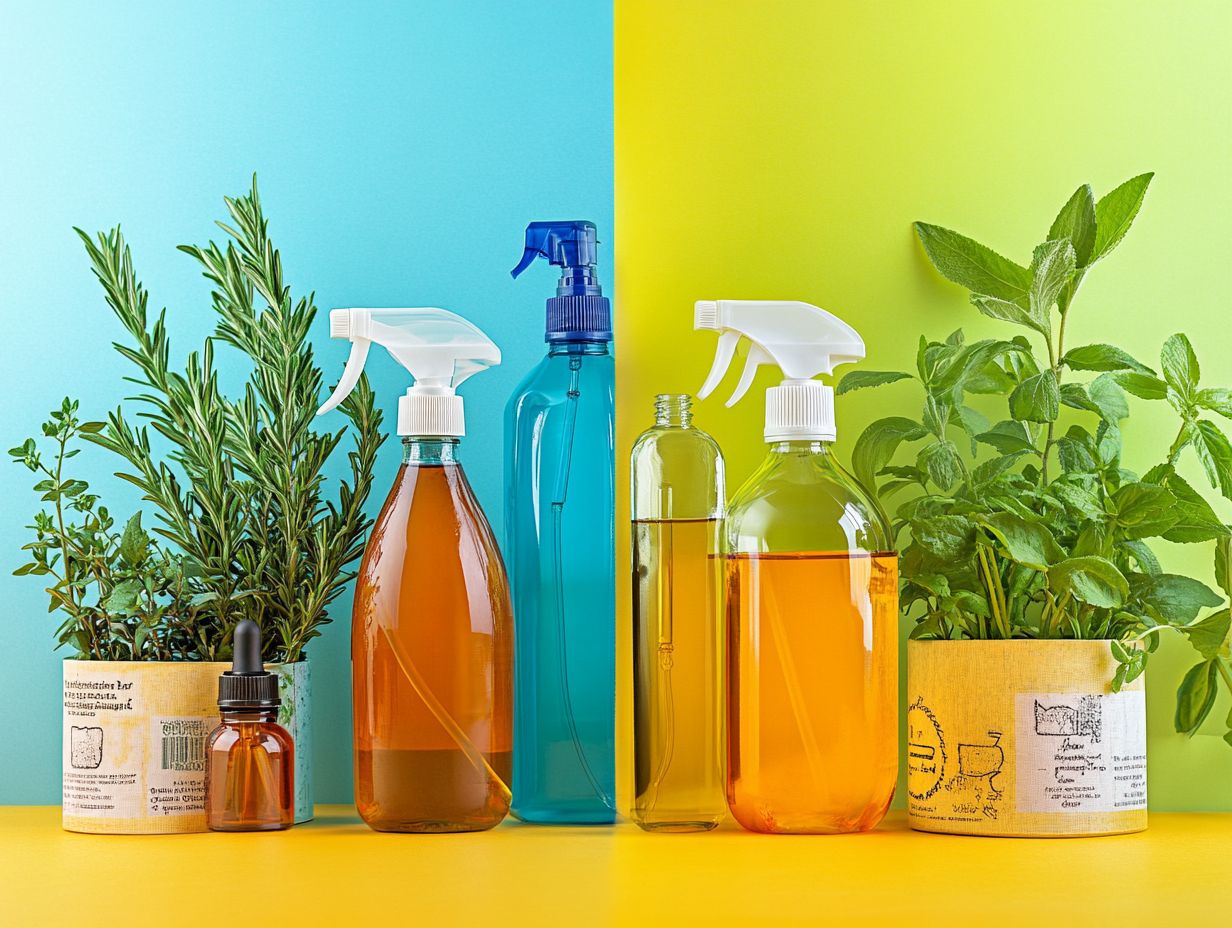
You can effectively harness the power of essential oils in a myriad of cleaning applications, effortlessly turning routine household chores into eco-friendly practices that foster a healthier living environment.
By tapping into the natural cleaning properties of essential oils, you can craft powerful cleaning solutions think all-purpose cleaners, disinfectant sprays, laundry detergents, and even delightful air fresheners all while steering clear of harsh chemical cleaners.
This remarkable versatility positions essential oils as an appealing option for those who are environmentally conscious and eager to elevate their cleaning routines.
Embrace these natural alternatives today for a cleaner, safer home!
1. All-Purpose Cleaner
Creating an all-purpose cleaner with essential oils is a straightforward yet effective way to maintain a clean and healthy home while embracing eco-friendly solutions.
By leveraging the capabilities of nature’s aromatic wonders, you can easily replace conventional cleaners packed with harsh chemicals. Essential oils like tea tree, lavender, and lemon not only fill your space with a delightful scent but also bring their unique antibacterial and antifungal properties into the mix.
Tea tree oil, renowned for its powerful disinfectant qualities, can swiftly tackle germs, while lemon oil serves as a natural degreaser, effortlessly cutting through stubborn grime.
Lavender, with its soothing aroma, doesn t just uplift your mood; it also works as a gentle antiseptic. This simple combination highlights just how effective an all-purpose cleaner can be, making it perfect for a variety of surfaces throughout your home.
2. Disinfectant Spray
An essential oil-based disinfectant spray can serve as a powerful ally in your quest to eliminate germs and bacteria, offering a natural alternative to traditional disinfectants.
By tapping into the antibacterial properties of essential oils like tea tree, lavender, and eucalyptus, you can craft a highly effective cleaning solution tailored to your needs. Just combine a few drops of your chosen oils with a carrier (a base liquid like witch hazel or vinegar) in a spray bottle.
These essential oils not only bring delightful fragrances to your space but also boast impressive antimicrobial qualities, making them perfect for sanitizing surfaces like countertops, doorknobs, and bathroom fixtures.
Regular use of this homemade spray helps you maintain a pristine environment while significantly reducing harmful pathogens. It s an excellent choice for any household committed to health and wellness.
3. Laundry Detergent
Incorporating essential oils into your homemade laundry detergent enhances its cleaning power and infuses your clothes with delightful fragrances, transforming your laundry routine into a more enjoyable experience.
This natural approach ensures that your garments emerge fresh and clean while eliminating the harsh chemicals often found in commercial products. By using ingredients like baking soda, washing soda, and vinegar, you can effectively tackle tough stains while treating your fabrics with the gentleness they deserve.
Essential oils such as lavender, lemon, or tea tree oil not only provide captivating scents but also offer antibacterial properties, making them ideal for maintaining hygiene in your everyday laundry. Embracing these natural ingredients is a straightforward yet powerful way to care for both your wardrobe and the environment.
These oils are also biodegradable and eco-friendly, promoting sustainability without sacrificing efficiency.
4. Air Freshener
Essential oils can effortlessly be transformed into natural air fresheners, offering you a safe and delightful aroma that elevates the ambiance of any space.
By using these oils, you can reduce air pollutants and minimize volatile organic compound (VOC) emissions commonly found in synthetic cleaners.
Tap into the power of these fragrant oils to create your own custom blends, ensuring a fresh environment without synthetic fragrances or harmful chemicals often found in commercial air fresheners.
Popular essential oils like lavender, lemon, and eucalyptus fill the air with enchanting scents while providing benefits ranging from relaxation to invigorating air purification. This approach supports non-toxic living and reduces health risks associated with synthetic cleaning products.
Crafting air fresheners with essential oils can be both a fun and rewarding experience. Experiment with various combinations to discover the perfect scent that resonates with your personal taste and preferences.
Why not give it a try today?
Which Is Better: Essential Oils or Chemical Cleaners?
When you’re faced with the decision between essential oils and chemical cleaners, the conversation often revolves around which choice truly enhances your cleaning routine while fostering a healthy home environment.
Essential oils offer many health benefits and eco-friendly solutions that can seamlessly substitute traditional chemical cleaners, enabling you to prioritize both safety and sustainability in your cleaning practices. They also serve as plant-based cleaners with non-toxic formulas, making them ideal for eco-conscious consumers.
By carefully weighing the pros and cons of each alternative, you can make informed choices that resonate with your values and health considerations. Evaluating the environmental impact and cleaning efficiency of each option will help you select the right cleaning products for your needs.
Key Factors in Choosing Your Cleaners
When weighing the decision between essential oils and chemical cleaners, several factors deserve your careful consideration, including effectiveness, health risks, and environmental sustainability. It’s also important to evaluate their impact on water resources and energy conservation.
Price is often a critical factor in your decision-making process. While essential oils may have a higher upfront cost, they could provide a longer-lasting solution that balances out the expense over time.
Cleaning efficiency also plays a significant role; you might notice that some chemical cleaners deliver immediate and striking results, whereas essential oils may require a bit more time to reveal their full potential. Using concentrated formulas and refillable bottles offers more cost-effective cleaning solutions, as refillable bottles allow you to reuse containers, reducing waste.
Safety should be at the forefront of your mind if you or your loved ones have allergies or respiratory issues, natural options may be preferable to minimize the risk of adverse reactions. Additionally, personal health concerns, such as the need for non-toxic products in homes with children or pets, can heavily influence your choices, making this evaluation process quite nuanced. Opting for green cleaning methods with natural cleaning products can help you create a healthy home environment.
Personal Preference
Ultimately, your personal preferences play a significant role in your decision-making process regarding the use of essential oils versus chemical cleaners. Your individual values and priorities will heavily influence the choices you make. Considering the health hazards associated with toxic chemicals, many are leaning towards natural cleaning products.
Imagine the soothing scents of essential oils transforming your living spaces, contrasting sharply with the more clinical aromas often associated with chemical cleaners. Familiarity may also weigh heavily in your choices; if you grew up in a household where harsh chemicals were the norm, you might find it challenging to embrace natural alternatives. On the other hand, you could find solace in the earthy scents of lavender or tea tree oil.
Perceptions of effectiveness also differ among individuals. Some may place their trust in the robust cleaning power of established chemical solutions, while a growing number are turning to the gentle yet potent nature of essential oils, convinced of their ability to effectively combat bacteria and odors.
Act now! Reflect on your values and health considerations to make the best choice for your home. Transitioning to eco-cleaning products can also support broader efforts in waste reduction and environmental awareness.
Final Thoughts
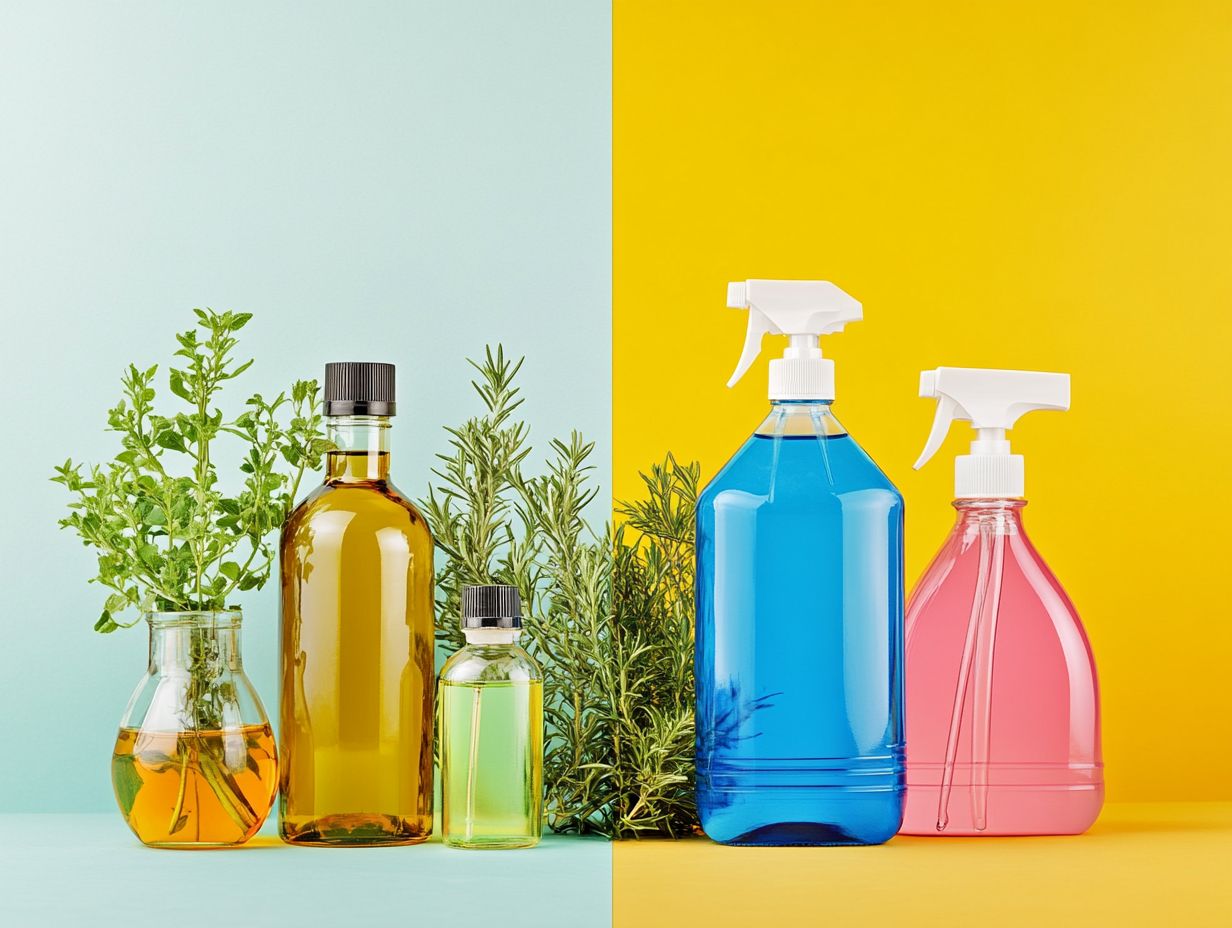
The choice between essential oils and chemical cleaners ultimately revolves around your values and health considerations. It s also about your aspiration for a cleaner, healthier home. A commitment to safe living and environmentally friendly practices can further guide your decision.
If you prioritize natural solutions, you ll likely find yourself leaning towards essential oils. They offer numerous benefits, including antibacterial properties, delightful fragrances, and minimal environmental impact. This transition to plant-based alternatives not only enhances your personal well-being but also contributes to a healthier planet. Companies like Branch Basics, Force of Nature, Supernatural, and ECOS provide excellent options for eco-conscious products.
By embracing essential oils, you can effectively reduce the risks associated with the harsh chemicals commonly found in conventional cleaners. These chemicals often pose health threats or trigger allergies. Therefore, take a moment to assess these factors and make empowering choices that align with your personal health objectives and commitment to ecological responsibility.
Furthermore, opting for sustainable packaging and materials that break down naturally can significantly lower your ecological footprint, supporting broader waste management efforts. Make the switch today for a cleaner, healthier home!
Frequently Asked Questions
What are essential oils and chemical cleaners?
Essential oils are naturally derived oils from plants that have a variety of aromatic, cleaning, and healing properties. Chemical cleaners, on the other hand, are man-made products specifically formulated for cleaning purposes. Many natural cleaning products include plant-derived surfactants, which help remove dirt and grease, along with other organic ingredients for effective cleaning.
What are the benefits of using essential oils for cleaning?
Essential oils are known for their antibacterial, antiviral, and antifungal properties, making them effective in killing germs and bacteria. They also have a pleasant scent and are free from harsh chemicals, making them safe for use around children and pets. Many people choose essential oils for household cleaning because they are safer alternatives.
How do chemical cleaners compare to essential oils in terms of effectiveness?
Chemical cleaners may be more effective in killing a wider range of germs and bacteria, but they often contain harsh chemicals that can be harmful to both humans and the environment. Essential oils may not be as strong, but they are still effective in cleaning and disinfecting surfaces. Using eco-friendly cleaning solutions like essential oils supports environmental sustainability and safe living.
Are essential oils more expensive than chemical cleaners?
It depends on the brand and type of essential oil and chemical cleaner. Some essential oils may be more expensive than a generic chemical cleaner, but they are also more versatile and can be used for other purposes aside from cleaning. In many cases, opting for eco-cleaning products like essential oils supports a more cost-effective cleaning strategy over time.
Can essential oils and chemical cleaners be used together?
Yes, they can. You can mix essential oils with your chemical cleaners to enhance their cleaning power and add a pleasant scent. However, be cautious of any potential reactions or conflicting scents between the two. This practice can also lead to a more innovative cleaning approach.
Which is better for the environment, essential oils or chemical cleaners?
Essential oils are generally considered more eco-friendly since they are derived from natural sources and do not contain harsh chemicals that can harm the environment. However, there are also some chemical cleaners that are labeled as environmentally friendly. Brands like ECOS and Supernatural offer green cleaning options that focus on minimizing environmental impact.



